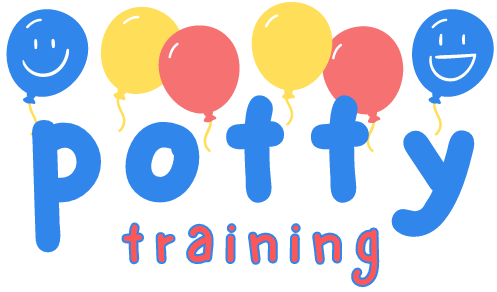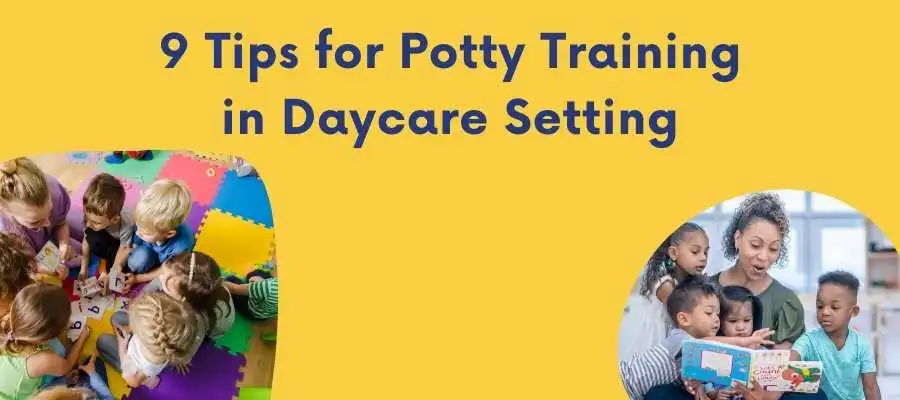Potty training is a big step for kids, especially when they’re going to daycare. It can be tricky for parents and caregivers, but I am here to help you with useful tips and ideas. I’ll talk about understanding daycare rules, working together with caregivers, and other important things to make potty training in daycare easier for you and your child
But before you look into potty training, whether at home or daycare, don’t push it if your child isn’t ready. Wait until you see clear signs that they’re prepared for this big step. Being patient and observant will make the whole process much easier.
Table of Contents

Knowing Daycare Policies and Procedures
Daycares have different rules when it comes to potty training. Some are lenient, while others have stricter requirements. However, there’s no federal law dictating these rules.
One big reason for daycare rules on potty training is keeping things clean and hygienic. Kids who aren’t potty trained yet might create more mess, which can be tough for daycare staff to manage.
Another reason might be daycare workers, who have a lot on their plate, from watching kids to teaching them. Dealing with diaper changes and helping kids with potty training adds to their workload. So, some daycares prefer kids who are already potty trained to ease the burden on staff.
These varying rules and policies of daycare can impact how children learn to use the toilet and how parents support them at home. Understanding these differences is crucial for parents, as it enables them to assist their children effectively with potty training both at home and in their childcare environment.
Potty training is a big deal, especially in daycare where routines and rules matter a lot. Some daycares have specific rules depending on whether kids are potty trained or not. These rules decide who gets to hang out together and what activities they can do. Some daycares are really helpful with potty training, while others have strict rules. Sometimes, if kids aren’t potty trained, they might not be allowed to stay at the daycare for a while. It’s important for parents to understand these rules so they can help their kids with potty training at home and in daycare
Getting Started with Potty Training at Daycare
When kids start potty training at daycare, it usually begins by introducing them to the idea of sitting on the toilet. If a child is scared at first, caregivers might encourage them to sit on the toilet until they feel okay about it. As time goes on, kids get used to sitting there and learn what to do using words they can understand.
Even as kids get better at using the toilet, daycare staff might still use diapers until they have a regular routine for going to the bathroom and understand when they need to go.
Moving to Underwear
Once kids are comfortable with a toilet routine and show they’re ready, daycare providers switch them to wearing underwear. But kids might still need help or reminders to use the toilet by themselves. Daycare rules usually say that kids have to be fully potty trained before they can move up to the next group or class. However, there might be exceptions for kids with special needs who need extra help. In those cases, daycare workers will work closely with parents and use special ways to help the child learn to use the potty.

Strategies for Successful Daycare Potty Training
Successfully potty training a child in a daycare setting requires a combination of patience, consistency, and collaboration between parents and caregivers. Here are some effective strategies to consider:
➡️ Understanding Daycare’s Plan
Having open discussion with daycare teachers is crucial to understand their approach to potty training. Parents should inquire about how they handle accidents and whether they assist children in the bathroom. Questions like the distance of the bathroom from the classroom, the frequency of potty breaks, and the level of assistance provided are important. Understanding how they address stubbornness or resistance can also give insights into the daycare’s plan.
➡️Teamwork with Daycare Staff
If a child keeps having accidents at daycare even though they’re potty trained at home, it’s important for parents, teachers, and administrators to work together. By teaming up, they can come up with good ideas to help the child and give them extra support, You have to mimic the same routine and potty schedule that kids follow up at daycare to achieve a faster result.
➡️ Realistic Expectations
It’s essential for parents to understand that their child may have more accidents at daycare than at home due to the busy and sometimes distracting environment. Setting realistic expectations and approaching potty training with patience and empathy can help alleviate stress for both parents and children.
➡️ Open Communication
It’s important for parents to stay in touch with daycare teachers to see how their child is doing with potty training. Regular chats with teachers can help catch any problems early and make sure everyone is on the same page.
➡️ Giving Rewards🧸🍭
Using a reward system at both home and daycare can encourage kids to use the potty by themselves. Whether it’s stickers, small toys, or just saying “good job,” giving positive feedback can make potty training more fun for kids.
Ask daycare teachers if they have ways for kids to support each other during potty training. When classmates cheer each other on, it can help kids feel more confident about using the bathroom by themselves.
If you’re wondering whether rewards are essential for potty training, take a look at this article here
➡️ Underwear Under Pull Ups
Some daycares insist that children wear pull-ups exclusively during potty training to minimize accidents. However, a more effective approach is to have children wear underwear beneath the pull-ups. This allows them to feel wet if accidents happen, aiding in their understanding of when they need to use the potty. By combining pull-ups with underwear, we can make potty training smoother, encourage independence, and reduce messes
➡️ Making Accidents Okay
It’s normal for accidents to happen when kids are learning to use the potty, especially at daycare. Parents and daycare workers should be patient and understanding when accidents occur, avoiding getting upset, so kids stay motivated to keep trying.
➡️ Extra Cloths
To deal with accidents, parents should make sure their child has extra clothes and supplies ready. Choosing pants that are easy to pull up and down, like stretchy ones without buttons or zippers, can make it easier for kids to go to the bathroom by themselves and make cleanup quicker.
➡️ Documenting Strategies
Writing down what you’re doing to help your child learn to use the potty, and how they’re doing, is really important. This helps everyone who takes care of your child do things the same way. Parents should write down what they’ve decided to do and share it with daycare workers so everyone knows what to do. It’s also good to talk often and tell each other how the child is doing, so any problems can be fixed quickly.
Addressing Common Concerns🙋🏼♀️
Parents often have questions or worries before starting daycare. I’ll do my best to address some of the most common ones here!
Can a Child Be Kicked Out of Daycare for Not Being Potty Trained?
As per my experience, it’s very rare for a child to be kicked out of daycare just because they’re not potty trained. But it’s important for parents to know the daycare’s rules about potty training, as I mentioned at the start, and work together with the staff to help their child learn.
Do Preschool Teachers Change Diapers?
Usually, preschool teachers don’t change diapers because most kids in preschool are expected to be potty trained or learn to use the toilet. However, there are exceptions for kids who need extra help due to special needs or slower development.

Should Daycare Facilities Assist with Potty Training?
Daycare can give some help and encouragement with potty training, but parents are mainly responsible for teaching their children to use the toilet. Daycare staff can support what parents are doing at home, but the main job of potty training falls on the parent’s shoulders.
Do Daycare Wash Soiled Pants?
Daycares typically can’t wash soiled clothing due to regulations from the Centers for Disease Control & Prevention. Instead, they’ll place the dirty clothes in a plastic bag for you to take home and wash. To make things easier, consider buying inexpensive underwear from stores like Target or the Dollar Store. You can then ask the daycare staff to dispose of the soiled underwear, saving you the hassle of washing it yourself.
What is the Best Age to Start Daycare?
The best time to start daycare depends on your family’s situation and what you prefer. But various research shows that, starting daycare when your child is between 12 to 18 months old can be really helpful. At this age, kids start getting more curious about other kids and the world around them. So, going to daycare can help them learn how to play with others and explore new things in a structured way.
How Long it Take for a Child to Adjust at Daycare?
It seems that the time it takes for a child to adjust to daycare can vary widely. Some children may adjust within a week or two, while others may take a bit longer, perhaps a month or more. It’s common for children to experience tears and anxiety during drop-offs initially, but many eventually adapt and become comfortable with their daycare environment. Each child is unique, so the adjustment period can differ from one child to another.
Conclusion
Potty training can be tough but also fulfilling for both parents and kids, especially when dealing with daycare or preschool. By knowing the rules at daycare, talking openly with caregivers, and using good strategies, parents can help their children do well with potty training. Remember, every kid is different, so progress might be different for each one. With patience, sticking to a plan, and working together, parents can help their children get the hang of using the potty, even while they’re at daycare.
Feel free to drop a comment if you encounter any challenges with potty training at daycare that I haven’t addressed here

